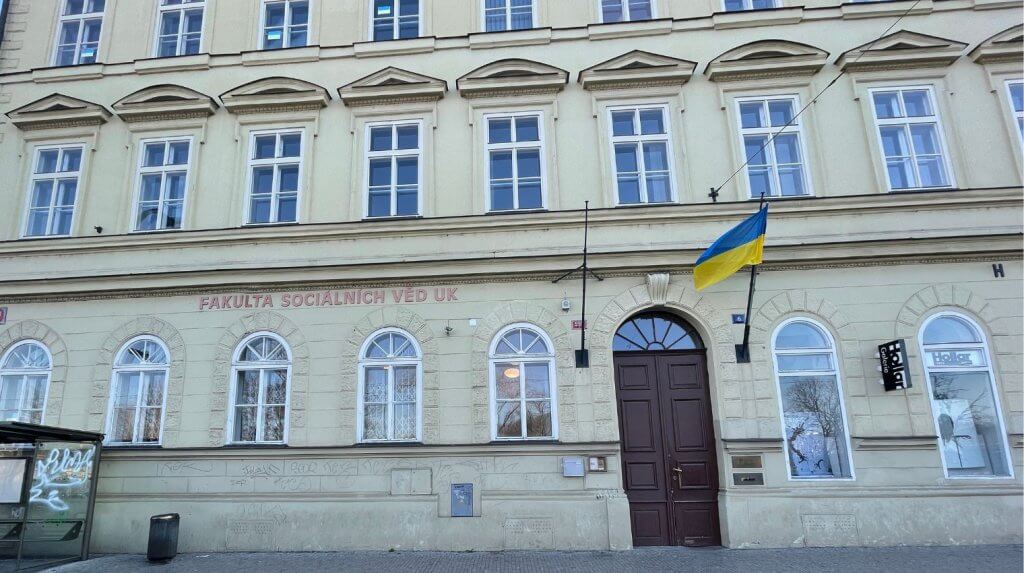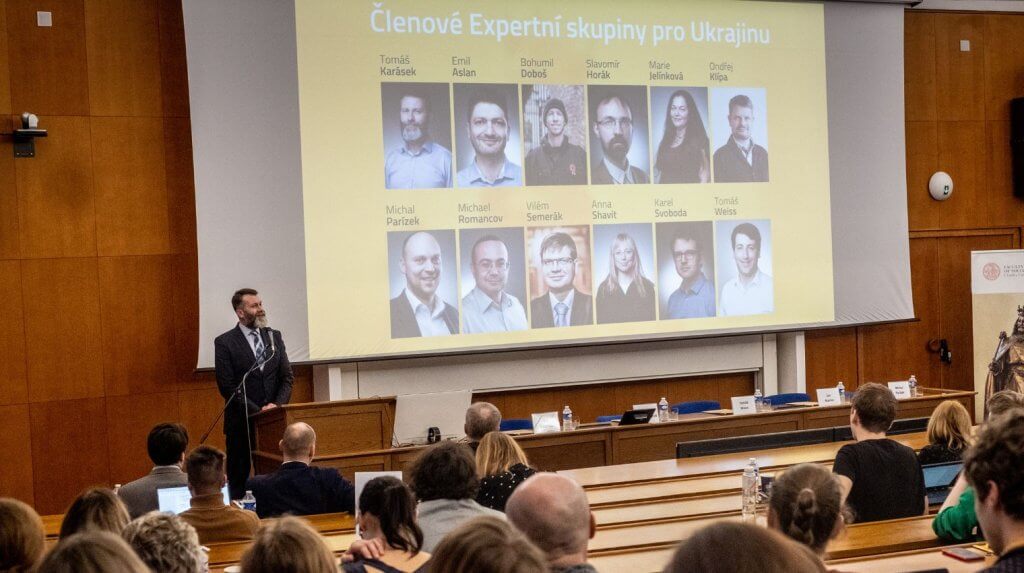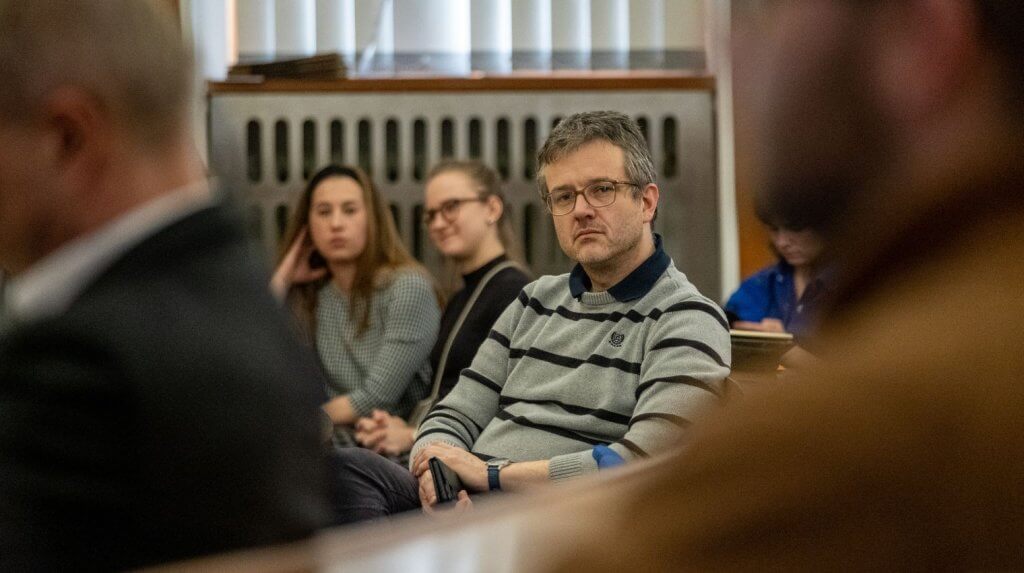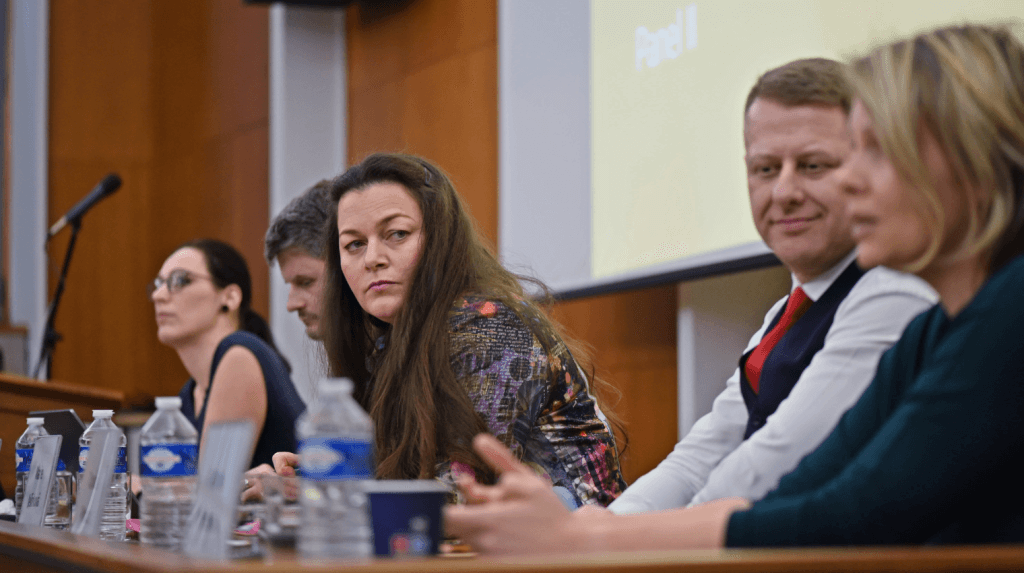The second anniversary of the Russian invasion of Ukraine: How should the Czech Republic effectively support Ukraine now?

On February 24, 2024, two years will pass since Russian troops entered the territory of Ukraine. On this occasion, academics from the Expert Group for Ukraine (ESU), which was established at the Faculty of Social Sciences, Charles University, present their view of what the Czech Republic should do in the coming months to effectively help Ukraine and support its resistance against Russian aggression.
Experts from FSV UK agree above all on the need to intensify communication at the national and international level. Many of them believe that the Czech Republic should continue to try to keep the war in Ukraine as the main agenda of European politics. According to Michal Parízek from the Institute of Political Studies, Czech representatives should openly prioritize building a collective position of the European Union states in relation to the war, including mechanisms for military and economic support to Ukraine. “And even at a time when it will mean risks for ties within the Visegrad Group,” emphasizes Parízek.
In this context, Tomáš Weiss from the Institute of International Studies mentions that in light of the eruptions of new and older conflicts in the world and above all the growing crisis on the American political scene, which may result in the re-election of Donald Trump as president, we need a stronger European Union that is able to act faster and more in unison. “And that will be difficult without greater integration and the transfer of powers to the European level, especially in foreign and defense policy,” notes Weiss.
Active international cooperation, according to Ondřej Klípa from IMS, is needed even with the risk of possible political turbulence in Russia, a certain degree of nuclear threat and the growing resistance of the domestic population against aid to Ukraine. “Otherwise, Vladimir Putin will probably win the war (he is prepared for long attrition battles), which means, among other things, a disaster for the entire eastern wing of NATO,” says Klípa.

Intensive cooperation also outside the EU
Some of the academics also consider it an important challenge to be active in states that do not perceive Russian aggression as a key foreign policy issue and are rather inclined to believe Russian narratives. In this respect, according to Slavomír Horák from IMS, unfortunately, the Czech Republic is losing its reputation as a country that could speak from a “non-(post-)colonial” position. “Instead, it is increasingly perceived as a ‘Western’ or ‘American’ lackey with no independent right to exist, entirely in the spirit of the Russian narrative,” Horák says.
Specifically in the context of Africa, according to Bohumil Doboš from IPS, there is the need to maintain active public diplomacy and thereby help counter Russian and Chinese (dis)information operations. “It is good that Czech diplomacy towards the continent is being actively re-established after the period of withdrawal and cancellation of embassies. However, in order for this action to have the desired impact, it is necessary that the current positive trend be maintained in the long term,” points out Doboš. “However, it is crucial that these activities help increase compliance with sanctions and expand Russia’s diplomatic isolation in a region that is neither necessarily pro-Western nor pro-Russian,” he summarizes.
Challenges for Czech society
At the national level, according to Weiss, the current government should further explain to the citizens why the Ukrainian victory – or at least a result that comes as close as possible to it – is important for the Czech Republic. “Indeed, the money invested in Ukrainian defense is not money taken from Czech citizens, but on the contrary, in this situation, it is money invested in the Czech future,” emphasizes Weiss. “At the same time, the Czech political debate should leave the old ideological trenches and admit that the new situation requires new approaches.”
According to Karel Svoboda from IMS, the Czech government has very well set up support mechanisms for Ukraine and has a relatively clear understanding of the given problem. Even so, the government should always insist on a clear distinction between the aggressor and the victim. “Any efforts to balance the East and the West lead only to a shift to the East, which is difficult to reverse,” says Svoboda. “For academics, the task is more than clear – correcting Russian visions, be it Putin’s versions of history, propagandistic claims about the qualities of Russian ‘democracy’ or the ‘successes’ of the Russian economy. Russia is certainly not invincible and its economy is by no means flawless, as it tries to present to us,” he adds.

Among other things, according to Parízek, the Czech Republic and its representatives should in no way undermine trust in multilateral institutions and in particular the United Nations, both domestically and on the international scene. “Attacks on the UN or its institutions are the last thing that will bring greater security to Central and Eastern Europe and a greater chance for Ukraine to win the war. If for Russia the war is part of the redrawing of the world order, there is no need to facilitate its efforts by antagonizing the countries of the Global South, for whom the UN is both symbolically and materially very important,” emphasizes Parízek. Along with this, he also draws attention to the fact that, as time progresses, the world’s attention is turning away from the war in Ukraine. States and their public are gradually focusing on newly emerging crises and long-term foreign policy agendas. “At the same time, a number of key allies of Ukraine, led by the US, are turning more to their own domestic politics. Empirical data on media coverage of the war demonstrate a declining interest in it throughout the world, including Central and Eastern Europe.”
At the national level, according to Klípa from IMS, it is also important to draw attention to the fact that in the event of a worsening of the situation in Ukraine, for example a Russian breach of the Ukrainian defense this spring, a new and even larger wave of refugees will arrive. In this context, Marie Jelínková from the Institute of Sociological Studies, who has been working on the topic of migration for a long time, emphasizes that the Czech Republic should increase its support for Ukrainian migrants instead of increasing restrictiveness. “A terrifying 57 percent of Ukrainian families live below the income poverty line in the Czech Republic, often mothers with children. At the same time, the integration of migrants into society works if they can participate in what is common in society. This life in great poverty does not allow,” points out Jelínková.
According to her, in the Czech Republic there is still a lack of sufficient investment, for example, in the support of specialized language courses. This then has a negative impact on the situation of Ukrainian children in the country, who are crucial for the future of Ukraine. “Their parents in the Czech Republic also need certainty of residence status, as temporary protection will (apparently) end in March 2025. It would be reasonable to replace it with a residence title that would reflect the fact that many Ukrainians live in some way in both countries,” she adds.

Need for more military support
Some academics also mention the need for more intensive military aid to Ukraine. “Given the disparity in the manpower of the warring parties, only one thing is necessary for victory – to dramatically increase the technical superiority of the Ukrainian army. The Czech government should lobby for this by all means,” believes Klípa from IMS. According to Jelínková, Czech society in general should prepare for the fact that Russian aggression may not end with the war in Ukraine, which in her opinion will probably last for a very long time. “And that means fundamentally increasing defense spending and adapting the industry to it,” she points out.
In this context, Horák mentions that even two years after the start of the Russian invasion, it appears that academic and expert circles still underestimate Russia’s ability to go to war fully, regardless of the economic and, above all, human casualties. “Within the current war of attrition and the weak hope for any end, we have to admit that with the support that Ukraine is currently receiving, it does not have many options to regain its lost territories,” states Horák. “On the contrary, we are currently facing a fact that has been hovering over the entire operation since its beginning – Russia can win.”
The Expert Group for Ukraine (ESU) was established at the Faculty of Social Sciences, Charles University, in May 2022. It is an interdisciplinary policy group consisting of experts and academics from various fields of FSV UK. Since the beginning of ESU’s existence, they have offered professional and research-based contributions to ongoing debates in society in the form of professional articles (policy briefs).


